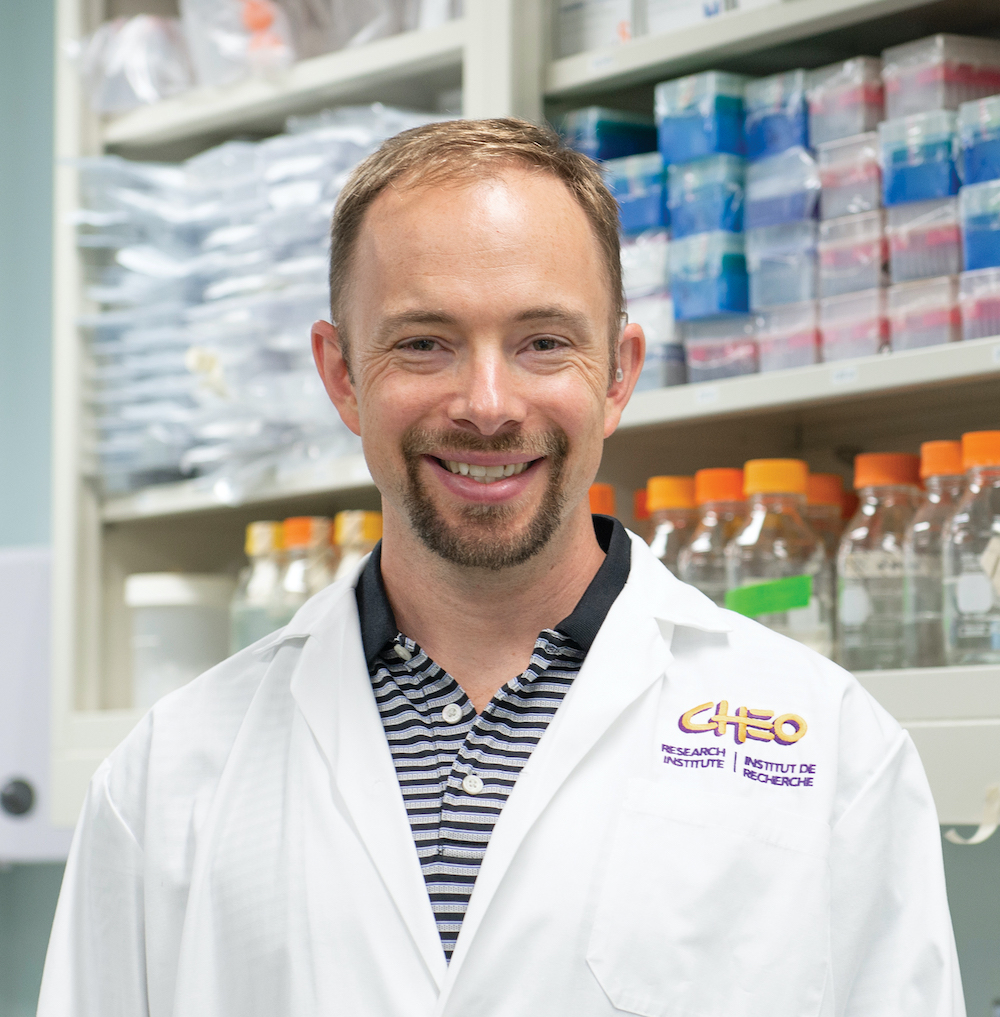Biography
Brief Biography
Dr. Shawn Beug obtained his BSc degree with Honours in Biology from the University of Regina. He went on to the University of Ottawa to pursue a MSc degree in Cellular and Molecular Medicine with Dr. Catherine Tsilfidis where he identified factors involved in salamander forelimb regeneration. Dr. Beug obtained his PhD in Biochemistry based on his research with Dr. Valerie Wallace, studying the mechanism of morphogen trafficking in the developing and adult mouse eye. He then pursued postdoctoral training with Dr. Robert Korneluk at the CHEO Research Institute in the area of cancer and immunotherapy. Now a Scientist at the CHEO RI, Dr. Beug and his team are using cutting-edge and complementary approaches to understand cancer and immunity.
Research Interests
The overarching goal of the laboratory is to understand the molecular and cellular regulators that control cell death, signaling, and immunity and to develop targeted therapies for cancer and immunological diseases. Common to these processes are a group of genes belonging to the Inhibitor of Apoptosis (IAP) family. Although the IAPs were classically defined to be blockers of programmed cell death, these proteins have recently been discovered to control other cellular processes through regulation of signaling complexes. Indeed, the dysregulation of the IAPs is associated with a variety of diseases including cancer and chronic inflammation.
Research Activities
- Decipher and understand cytokine signaling. Central to immunity is a large family of cytokines belonging to the TNF superfamily, chief among these is TNF alpha (TNFα). TNFα is responsible for a wide range of cellular signaling events leading to survival, cell death and inflammation; as such it is central for resistance to infection and cancer. TNFα also has negative roles: chronic production of TNFα is associated with autoimmune inflammatory disorders and cancer development. The signaling by TNFα and other TNF superfamily members is controlled by the E3 ubiquitin ligase function of two IAPs, cIAP1 and cIAP2. A major research effort is to understand the regulation TNF superfamily signaling in both cancer and immune cells using biochemical, RNA or DNA sequencing, and high-throughput biochemical or phenotypic screens.
- Characterize the interplay between cancer and immune cells, and development of cancer therapies. Cancer affects many tissues and is triggered by numerous genetic lesions involving oncogenes and tumour suppressors. The interplay between the immune system and cancer is complex: cancer cells adopt strategies to avoid immune detection and destruction while chronic inflammation can cause cancer. Using genetically modified mice, biologics and novel small molecules, the laboratory is investigating the role of IAPs in mediating tumour immunity and the use of small molecules to confer sensitization of cancer cells to immune attack. As a result from these studies, we are developing of highly potent and targeted therapies and strategies, including the translation of these approaches into clinical trials. Of particular interest are models of pediatric cancer, such as neuroblastoma and glioblastoma, and bladder and pancreatic cancer in adults that represent significant unmet medical needs.
- Understand the function of immune cells. A number of immune disorders have been linked to aberrant IAP expression. Additionally, recent studies have revealed that many signalling processes controlled by the IAPs are critical for proper immunity. Accordingly, using cutting-edge approaches such as CyTOF and single-cell RNA sequencing, the laboratory is characterizing the immunomodulatory properties of these factors in regulating T cell biology. The goal of this research is to further our understanding of immunity in homeostasis and disease, and to design effective strategies for immune-based disorders.
Dr. Beug’s laboratory is funded by SickKids, CIHR, CRS, and the CHEO Foundation. Students and postdoctoral fellows who are interested in the exciting fields of programmed cell death, signaling, inflammation, cancer, immunology, and cancer immunotherapy are encouraged to contact Dr. Shawn Beug.
Selected Publications
- Malone K, Dugas M, Earl N, Alain T, LaCasse EC, and Beug ST. (2024). Astrocytes and the tumor microenvironment inflammatory state dictate the killing of glioblastoma cells by Smac mimetic compounds. Cell Death Dis. 15:592.
- Beug ST, Cheung HH, Sanda T, St-Jean M, Beauregard CE, Hapsatou M, Baird SD, LaCasse EC and Korneluk RG. (2019). The transcription factor SP3 drives TNFα expression in response to Smac mimetics. Sci. Signal. 12: eaat9563.
- Beug ST, Pichette SJ, St-Jean M, Holbrook J, Walker DE, LaCasse EC and Korneluk RG. (2018). Combination of IAP antagonists and TNFα-armed oncolytic viruses induce tumor vascular shutdown and tumor regression. Mol. Ther. Oncolytics. 10:28-39.
- Beug ST, Beauregard CE, Healy C, Sanda T, St-Jean M, Walker DE, Chabot J, Mohan A, Earl N, Lun X, Senger D, Robbins SM, Staheli P, Forsyth PA, Alain T, LaCasse EC and Korneluk RG. (2017). Smac mimetics synergize with immune checkpoint inhibitors to promote tumor immunity against glioblastoma. Nat. Commun. 8: 14278.
- Faye MD, Beug ST, Graber TE, Earl N, Xiang X, Wild B, Langlois S, Michaud J, Cowan KN, Korneluk RG and Holcik M. (2015). IGF2BP1 controls cell death and drug resistance in rhabdomyosarcomas by regulating translation of cIAP1. Oncogene. 34:1532-1541
- Beug ST, Tang VA, Lacasse EC, Cheung HH, Beauregard CE, Brun J, Nuyens JP, Earl N, St-Jean M, Holbrook J, Dastidar H, Mahoney DJ, Ilkow C, Le Boeuf F, Bell JC and Korneluk RG. (2014). Smac mimetics and innate immune stimuli synergize to promote tumor death. Nat. Biotechnol. 32: 182-190.
- Beug ST, Cheung HH, LaCasse EC and Korneluk RG. (2012). Modulation of immune signalling by inhibitors of apoptosis. Trends Immunol. 33:535-545.
